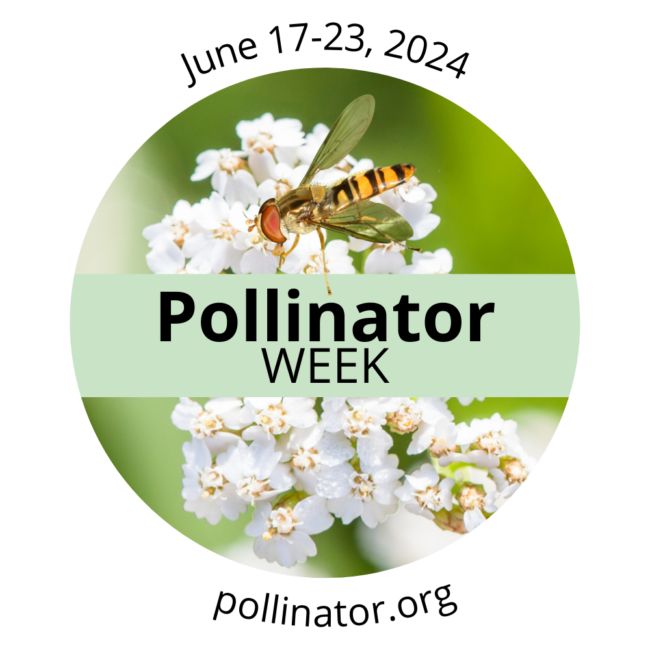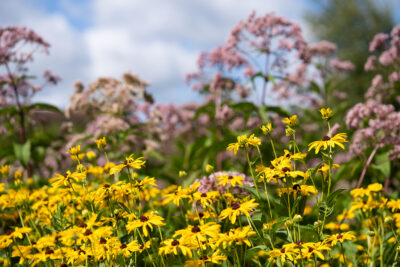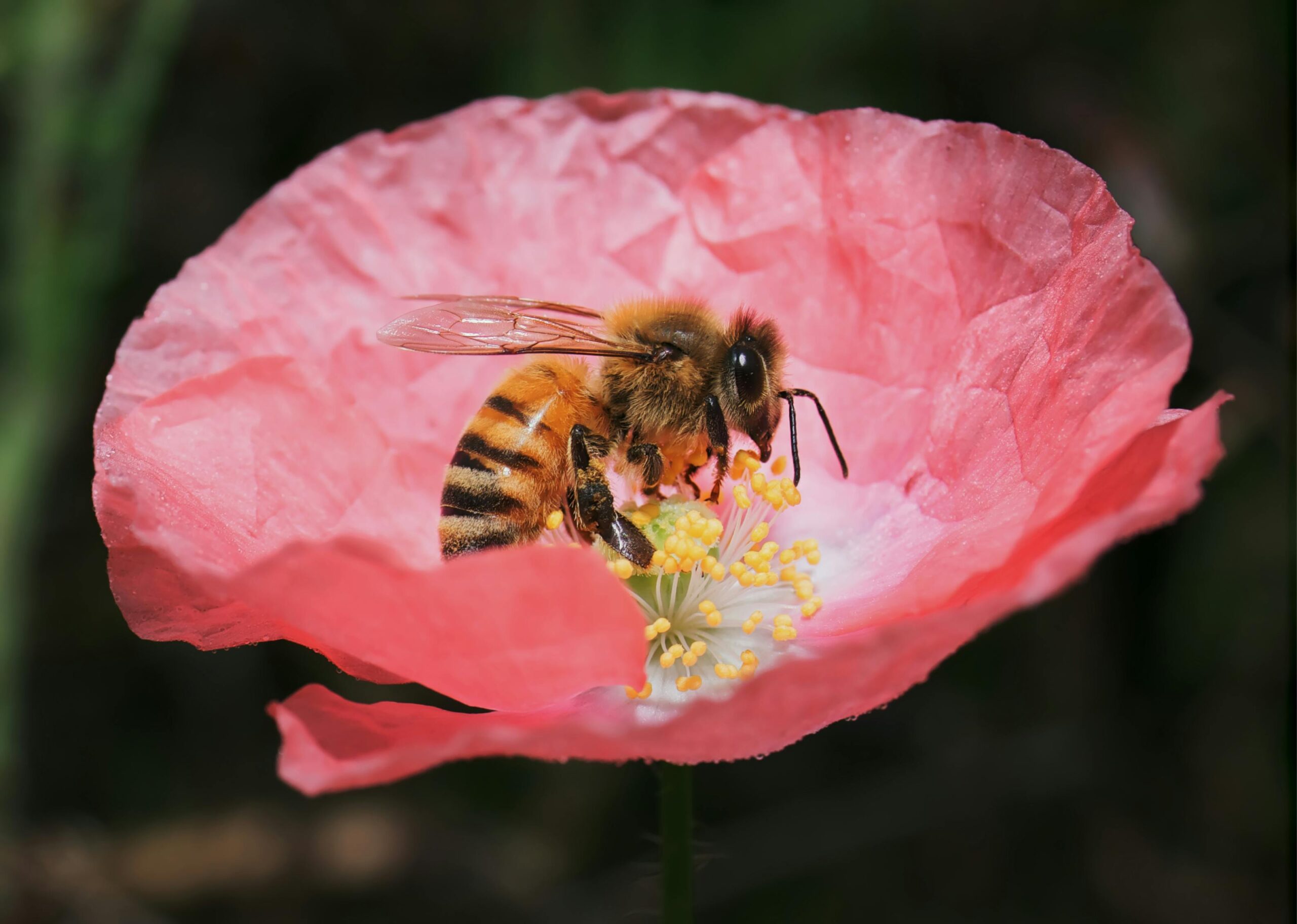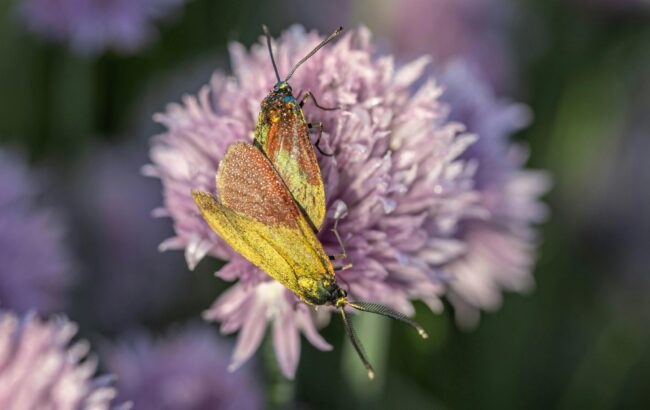Horticulture
Ask Your Gardening Question Here!

Wisconsin Celebrates Pollinator Week, June 17 – 23, 2024, is dedicated to raising awareness through statewide and local activities and events to support National Pollinator Week. By increasing knowledge and adopting pollinator friendly practices, we can improve pollinator health and habitats. National Pollinator Week is an annual event managed by he Pollinator Partnership to help spread the word about what we can do to protect pollinators.
A pollinator is any animal that visits flowering plants and moved pollen from flower to flower, which helps plants reproduce, making fruits and seeds. In North America, pollinators include bees, butterflies, moths, flower flies, beetles, wasps, hummingbirds, and in some parts of the southwestern U.S. and Mexico, nectar feeding bats. Some animals, like butterflies, move pollen while they are feeding on plant nectar. Bees are the most efficient pollinators because they also collect pollen as a protein source for their offspring, so they move the pollen around as they visit flowering plants. There are approximately 20,000 bee species in the world, 3,600 in the United States and over 400 in Wisconsin (DATCP Wisconsin Pollinator Protection Plan).
The Pollination of Native Plants

Date: June 18th, 2024
Time: 6:30 to 8:00 PM
Presented by Heather Holm, The Pollination of Native Plants is a fascinating journey that showcases the development of different flower types and the presentation of floral resources to pollinators. Exploring the types of insect pollinators, their foraging behavior, and the floral features that attract pollinators, Holm provides many specific examples of how native plants are pollinated, what pollinator is most effective, and why.
This program is free, but registration is required.
Registration: https://uwmadison.zoom.us/webinar/register/WN_v-39QW4RT_CRRXBD-MdoCg#/registration

Balancing Act in the Home Garden: Protecting Pollinators while Managing Pests
Date: June 19th
Time: 12:00 pm
Join us for an overview of integrating pollinator protection with pest management in your home landscape. We’ll cover the fundamentals of Integrated Pest Management (IPM), pesticide labels, and differences between systemic and contact pesticides, and discuss the toxicity of common products or ingredients to pollinators. By the end of this program, you’ll be prepared with strategies for simultaneously prioritizing pollinator protection and pest control in your own backyard.
Registration: https://uwmadison.zoom.us/webinar/register/WN_PuwTTH59QrW4syfJVM4sXQ#/registration
The Role of Moths in Our Ecosystem

Wednesday, July 24, Noon–1 p.m.
It’s National Moth Week!
What exactly are moths, and how do they fit into the landscape? Join us in learning about the general life history of moths and the evolutionary and ecological relationships between moths and plants using several native Midwest moth species. This presentation hopes to shatter an ecological conundrum: Moths are neither good nor bad. Moths just are.
Presented by Dr. Stephen Robertson, Pesticide Educator Extension Field Specialist, South Dakota State University Extension
Registration: https://uwmadison.zoom.us/webinar/register/WN_IqX5sIs0TbOvwSGI0yye1g#/registration
Stay up to date with the Monthly Newsletter – Sign Up!
Ask The Experts – Monthly Q&A Sessions Found Here
To learn more about the Barron County Master Gardeners – Visit their Facebook Page!
Wisconsin Master Gardeners Program
WIMGA
Sign up for the Monthly Plant Disease Diagnosis Clinic.
FLOWERS AND GARDENS
What’s the deal with “No Mow May”?
Container Gardening Mulches for Home Gardens and PlantingsCover Crops for the Home GardenGrowing Perennials
Sampling Lawn and Garden Soils for Analysis
Making and Using Compost in the Garden
Evaluating and Judging Flowers and House Plants
How to Grow Tuberous-Rooted Begonias and Gloxinias
Biological Control and Insects and Mites
Biological Control of Insects and Other Pests of Greenhouse Crops
Gladiolus Disorder Virus Complex and Aster Yellows
Gladiolus Disorder Fusarium Yellows and Bulb Rot
Geranium Bacterial Stem Rot and Leaf Spot
Deciduous Tree and Shrub Disorder Skeletonizing by Rose Chafer
COMPOSTING
LAWNS
Sampling Lawn and Garden Soils for Analysis
The Basics of Micro Irrigation
Lawn Establishment and Renovation
Identifying Grasses in Wisconsin Turf
Organic and reduced-risk Lawn Care
Do It Yourself Alternative Lawn Care Lawn Fertilization
Calibrating and Using Lawn Fertilizer and Lime Spreaders
Turfgrass Nutrient Management Planning
Supina Bluegrass for Lawns, Golf Courses, and Athletic Fields
FRUITS – BERRIES
Growing Strawberries in Wisconsin
Growing Currants, Gooseberries, and Elderberries in Wisconsin
Growing Raspberries in Wisconsin
Cover Crops for the Home Garden
Raspberry Pest Management for Home Gardens
Raspberry Disorder Fire Blight Spotted Wing Drosophila Invasive Pest of Soft skinned Fruit
Home Fruit Cultivars for Northern Wisconsin
Fertilizing Small Fruits in the Home Garden
Strawberry Pest Management for Home Gardeners
Strawberry Disorder Black Root Rot
Strawberry Disorder Angular Leaf Spot
Evaluating Cold Hardy Wine Grape Maturity Cranberry Pest Management in Wisconsin
Cranberry Pest Management in Wisconsin
Grape Pest Management for Home Gardeners
Cranberry Disorders Fungal Leaf Spot Diseases of Cranberry in Wisconsin
Cranberry Disorders Cranberry Stem Gall
FRUITS – TREE FRUITS
Apple Disorder Sooty Blotch and Flyspeck
Apple Pest Management for Home Gardeners
Plant Growth Regulator Use in Apples
Planning and Establishing Commercial Apple Orchards in Wisconsin
Apple, Pear, and Related Trees Disorder Fire Blight
Determining the Optimal Apple Harvest Date
Growing Apricots Cherries, Peaches and Plums in Wisconsin
Training and Pruning Apple Trees
Rootstocks for Fruit Trees in Wisconsin
Orchard Floor Management for Fruit Trees
Home Fruit Cultivars for Northern Wisconsin
Spotted Wing Drosophila Invasive Pest of Soft-skinned Fruit
Apple, Flowering Crap, Hawthorn, Juniper Disorder Cedar Rust Complex
DECIDUOUS TREES AND SHRUBS
Planning and Designing Your Home Landscape
The Basics of Micro Irrigation
Selecting Woody Landscape Plants for Fall Color
Winter Salt Injury and Salt-Tolerant Landscape Plants
Shade Trees Disorder Decline Dieback and Early Senescence
Maple Decline Collar Rot and Basal Canker Complex
Woody Ornamentals Pest Management in Wisconsin
Scorch and Related Problems in Trees and Shrubs
Plant Injury Due to Turfgrass Broadleaf Weed Herbicides
Effects of Flooding on Woody Landscape Plants
Deciduous Trees Disorder Springtime Weather Injury to Foliage
Deciduous Trees Disorder Miscellaneous Causes of Decline
Preserving Trees During Construction Mountain Ash Disorder – Sunscald Fungal Canker Complex
Mountain Ash Disorder Fire Blight
Maple and Other Trees Disorder Cottony Maple Scale
Honeylocust Disorder Canker Diseases in Wisconsin
Gypsy Moth Identifying and Managing Gypsy Moth Egg Masses
Deciduous Tree and Shrub Disorder Skeletonizing by Rose Chafer
Honeysuckle Disorder Honeysuckle Leaffolding Aphid
Honeylocust Disorder Plantbugs and Leafhoppers
Gypsy Moth Selecting a Pesticide for Gypsy Moth Control
EVERGREEN TREES AND SHRUBS
The Basics of Micro Irrigation
Colorado Blue Sprue and Conifers Disorders Rhizosphaera Needle Cast
Woody Ornamentals Pest Management in Wisconsin
Pine Disorder European Pine Sawfly
Preserving Trees During Construction
Pine Needle Diseases Brown Spot and Lophodermium Needlecast
Colorado Blue Spruce and Conifers Disorder Cytospora Canker
Winter Salt Injury and Salt-Tolerant Landscape Plants
Effects of Flooding on Woody Landscape Plants
Pine Disorder Dothistroma Needle Blight
VEGETABLES
Mulches for Home Gardens and Landscapes
Cover Crops for the Home Garden
Sampling Lawn and Garden Soils for Analysis
The Basics of Micro Irrigation
Commercial Vegetable Production in Wisconsin
Homegrown Tomatoes for Wisconsin
Storing Fruits and Vegetables from the Home Garden
Harvesting Vegetables from the Home Garden
Storing Fruits and Vegetables from the Home Garden
Growing Carrots Beets Radishes and Other Root Crops in Wisconsin
Growing Vegetables at Home Questions and Answers
Growing Broccoli Cauliflower Cabbage and Cole Crops in Wisconsin
Growing Onions Garlic Leeks and Other Alliums in Wisconsin
Growing Salad Greens in Wisconsin
Growing Pumpkins and other Vine Crops in Wisconsin
Growing Beans and Peas in Wisconsin
Growing Tomatoes Peppers and Egg Plants in Wisconsin
Exhibiting and Judging Vegetables
Biological Control and Insects and Mites
Tomato and Pepper Disorder Bacterial Spot and Speck
Tomato Disorders Fusarium and Verticillium Wilts
Tomato Disorder Physiological Fruit Problems
Vine Crops Diseases Phytophthora Blight
Tomato Disorder Early Blight and Septoria Leaf Spot
Managing Insects in the Home Garden
Vine Crops Disorder Powdery Mildew
Vine Crops Disorder Bacterial Wilt
Vine Crops Disorder Anthracnose
Tomato Disorder Post Harvest Fruit Diseases
Potato Disorders Common Scab and Powdery Scab
Onion Disorders Botrytis Leaf Blight Leaf Fleck and Neck Rot
LANDSCAPING
Planning and Designing your Home Landscape
Mulches for Home Gardens and Plantings
Cover Crops for the Home Garden
Sampling Lawn and Garden Soils for Analysis
Making and Using Compost in the Garden
Evaluating and Judging Flowers and House Plants
How to Grow Tuberous-Rooted Begonias and Gloxinias
Biological Control and Insects and Mites
Biological Control of Insects and Other Pests of Greenhouse Crops
Gladiolus Disorder Virus Complex and Aster Yellows
Gladiolus Disorder Fusarium Yellows and Bulb Rot
Geranium Bacterial Stem Rot and Leaf Spot
Deciduous Tree and Shrub Disorder Skeletonizing by Rose Chafer
TOPICS OF INTEREST
- Avian Influenza Information
- Tree Care Following Storm Damage(1 page, 9 KB)
- Flowering Crabapple Selections (2 pages, 35 KB)
- Moss in Lawn (2 pages)
- Creeping Charlie Control (2 pages)
HORTICULTURAL LINKS OF INTEREST
- UW – Department of Entomology Insect Diagnostic Lab
- UW – Extension Horticultural Publications
- UW – Landscape Plants of the Upper Midwest
- UW – Plant Disease and Diagnostic Clinic
- UW – Soil and Plant Analysis Laboratory
- UW – The Wisconsin Gardener – Public TV
- UW – Urban Horticulture
- UW – Urban Horticulture Updates
- UWEX – Wisconsin Native Plant Sources
- Wisconsin Department of Natural Resources
- Wisconsin Master Gardener Program
- University of Connecticut Plant Database
- Ohio State University PlantFacts
- USDA Plants Database
- Weed Science Society of America
- Wisconsin Phenological Society




